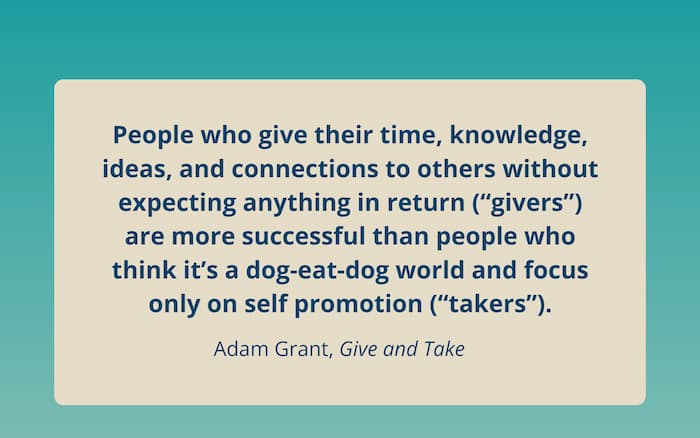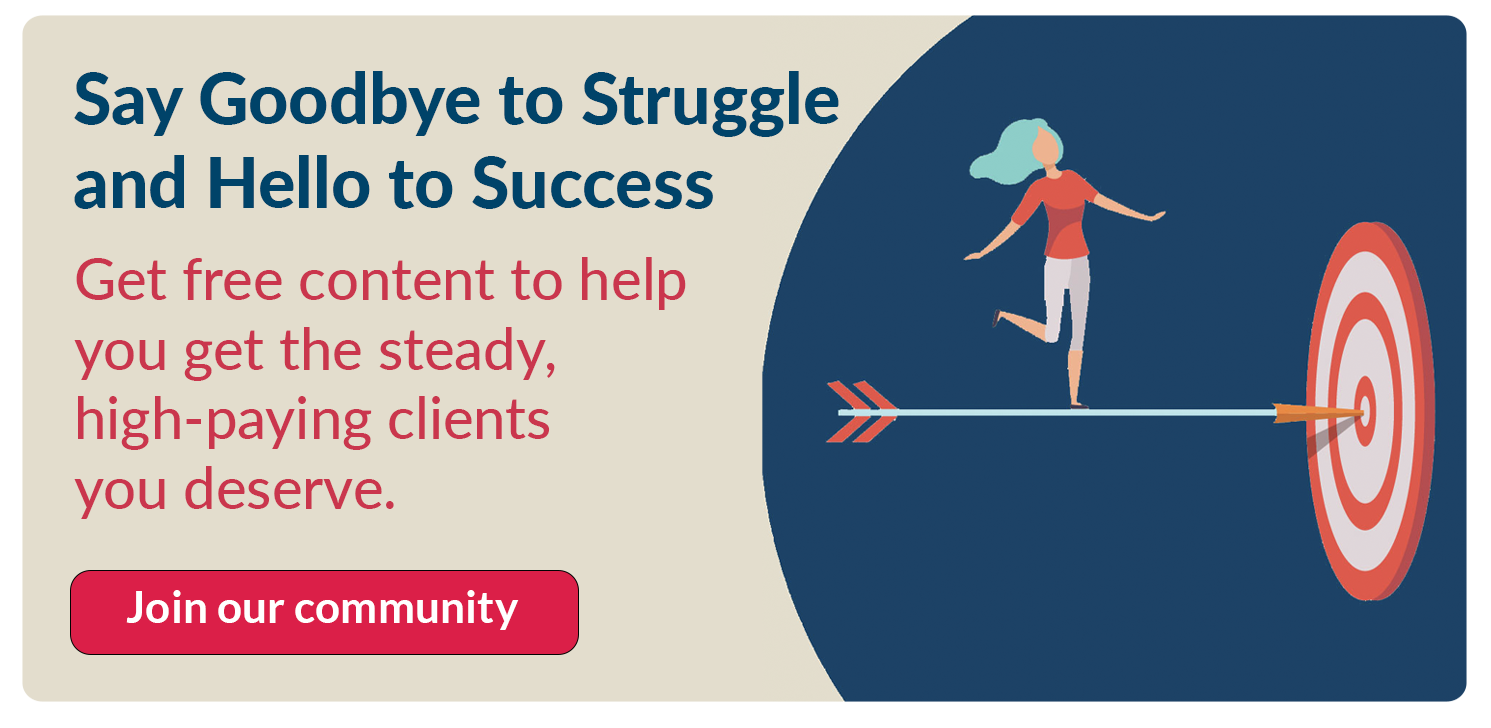What Happens When Freelancers Play Nice (Are Givers, Not Takers)

Freelancers who give more than they take (givers) are more successful than people who put themselves first (takers). The people you help will remember you when they have a freelance opportunity to share.
Remember when your parents taught you to play nice with other kids? Your parents wanted you to learn to share things with other people, and to grow up to be a kind person. What they probably didn’t know was that playing nice, or being a giver, would help you succeed as a freelancer.
Givers are More Successful
People who give more than they take (givers), are more successful than people who put themselves first.
For freelancers, being a giver in networking is a proven way to get great clients.
Yet, many freelancers don’t do this—or don’t do it enough.
Most of us are nice. We want to help others. But we tend to be introverts who aren’t comfortable networking.
Putting yourself out there enough to find out what another person needs may be scary. Doing something helpful may seem too forward.
Since the rewards of being a giver aren’t immediate, it may not seem important to find the time to help others. Or maybe you just don’t know how and what to share.
Proof that Being a Giver Works
Giving more than you get is the key to effective networking. And this actually makes networking easier. Instead of worrying about selling your services (which is NOT the purpose of networking), you focus on listening to the other person.

In his best-selling book “Give and Take,” Wharton Management Professor Adam Grant included many research studies and case studies, proves that nice guys (and gals) can finish first, not last.
“Being a ‘giver’ who enjoys helping others can be inefficient in the short run but surprisingly productive in the long run,” says Grant. Takers, on the other hand, try to come out ahead every time. In between are matchers, who help others but are motivated by what they’ll get in return. Matchers keep track of what they give and what they get. Most people, says Grant, are matchers. He also says that most people over-estimate their generosity.
Strong Relationships Lead to Great Clients
Being a giver is easy and free, and allows freelancers to build strong relationships with colleagues, prospects, and clients. By giving, we build trust and establish our credibility. The result, over time, is new clients.
I know this because it’s happened to me—many times. I’ve been helping other people since I started my freelance business in 1997. Although I never expected anything in return, some prospective clients who contacted me about freelance opportunities told me that they heard about me from someone I had helped.
Giving more than you take is one of 8 Ways to Build Your Network and Achieve Freelance Success.
5 Ways to Be a Giver
Always give more than you take in networking, both online and during networking events.

1. Listen more than you speak.
Whether you’re talking to someone face-to-face or reading something someone wrote online (e.g., on LinkedIn), “listen” to the other person. Ask about his/her work and interests. Look for things you have in common.
TIP: When you invite someone to join your LinkedIn network, or are invited to join someone’s network, check out his/her profile so you can write a personal comment. This usually leads to a discussion where you can find a way to help the person.
2. Share relevant information and resources.
Focus on providing information and resources that would help the other person, such as blog posts, reports, or podcasts.
TIP: Sign up for relevant email newsletters so resources come right to you. SmartBrief, for example, offers dozens of eNewsletters on general business and most industries.
3. Refer work to other freelancers.
Help other freelancers find work while at the same time helping clients find great freelancers who can meet their needs. This is a “double gift.” But before you refer someone, be sure you know that he/she is competent and dependable.
TIP: When you turn down a freelance assignment, ask if the client would like you to recommend other freelancers. They almost always say yes. After you find a qualified freelancer(s) and give the client names and contact information, this is a perfect opportunity to pitch yourself.
For example, a client recently contacted me about an interesting project that I can’t take on right now because it involves a lot of travel. The client was very grateful that I offered to look for another freelancer. I was able to find someone who was well qualified and interested. When I sent the client her name and contact info, I mentioned that I would be interested in working with the organization on projects that don’t involve travel.
The client said she’d pass my name and contact info on to her colleagues. That wouldn’t have happened if I hadn’t offered to help her first.
Even if you don’t offer any services that the client would use, you should try to be helpful. Several of my colleagues have gotten clients when someone they helped passed their name onto another client.
4. Connect people.
Introduce someone who wants to do a certain type of work to another person who does this work. Connect people who already do similar work. Connect people with vendors of services they need. For example, I often refer freelancers to my web and logo designer.
5. Mentor newer freelancers.
If you’re a seasoned freelancer, share what you’ve learned. It takes far less time for a seasoned freelancer to share resources and lessons learned than for a new freelancer to try to learn everything on his/her own.
Good Things Happen to Freelancers Who Are Givers
However you give more than you take, the people you help will remember you when they have a freelance opportunity or something else useful to share. It’s also easier to ask for help in the future if you’ve helped that person in the past.
Of course, giving more than you take doesn’t mean you can’t also ask people to share information and resources with you. But most of your networking should focus on helping others, and it’s never okay to blatantly ask someone you don’t know well for a referral.
If you focus only on yourself, you’ll get a reputation as a “taker” — and takers end up at the bottom of the success ladder, says Grant.

Learn More about Networking and How to Be a Giver
Content from The Mighty Marketer
FREE GUIDE: Ultimate Guide to Networking for Freelancers
8 Ways to Build Your Network and Achieve Freelance Success
Why Other Freelancers Should Be Your Best Friends
How to Grow Your Business with Help from Other Freelancers
6 Tips that Will Help You Succeed in Virtual Networking
12 Ways to Make Networking Events Amazing, Not Scary
Are You Greedy or Generous with you Freelance Pie (Work)?
Other Content
How to Succeed Professionally by Helping Others, by Adam Grant
The Top Ten Signs You Might Be a Taker, by Adam Grant
Give and Take, by Adam Grant